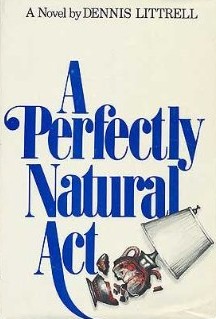 By DENNIS LITTRELL (Putnam; 1973)
By DENNIS LITTRELL (Putnam; 1973)
THE INVISIBLE MAN gets a thoroughly twisted updating in this forgotten relic from the early 1970s, when major publishers were actually willing to take on a perverse oddity like A PERFECTLY NATURAL ACT. It was the first, and only, novel by Dennis Littrell that wasn’t self-published, with that title having been slapped on it by Putnam (the initial title was THE INVSIBLE MAN, which was already taken).
Amid post-H.G. Wells invisibility narratives (TOPPER, MEMOIRS OF AN INVISIBLE MAN, HOLLOW MAN, etc.) A PERFECTLY NATURAL ACT enjoys a reasonably high rank. It’s certainly stronger than subsequent non-royalty published Dennis Littrell novels like HIGH SCHOOL FROM HELL.
It begins with the thirtyish John Schofield impulsively killing his wife. His reaction to the murder is decidedly unexpected: he becomes invisible (or at least believes he does). In this guise Schofield decides to give his over-stimulated sex drive a workout by raping as many women as he can find, mentally justifying his actions by codifying rape as a “perfectly natural act.”
From there we get an extended series of flashbacks, in which the details of Schofield’s debauched adulthood leading up to the killing are made clear. His life, we learn, was marked by a succession of failed relationships and an unnatural obsession with sex. It’s not insignificant that one of Schofield’s partners become a porn actress, or that one of his close friends was a producer of such fare. All this strife led to a mental breakdown, and inspired recurring fantasies about being invisible—hence Schofield’s present condition.
That Schofield isn’t actually invisible is obvious from early on (and also from a newspaper report in which one of his victims clearly describes his features), although the author never concretely says so. In fact, Schofield’s perceived invisibility has its own highly involved set of properties, such as the fact that anything the “invisible” Schofield touches turns invisible itself (or so he believes).
The novel is lively and readable in any event, providing a convincing depiction of madness that’s highly reflective of the unsettled era in which it was written. The protagonist’s near-continuous philosophical musings are offset by the sexual content, which is equally continuous, and unusually frank even by modern standards.
All well and good, but I’d question the gambit of clumping all the flashbacks into the middle of the book—alternating past and present chapters would have been preferable—which results in a rather saggy mid-section, and deflates any real intrigue or suspense the author may have been trying to generate.
